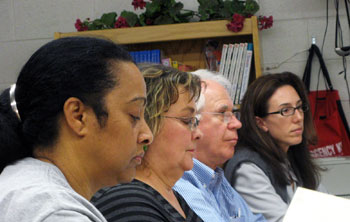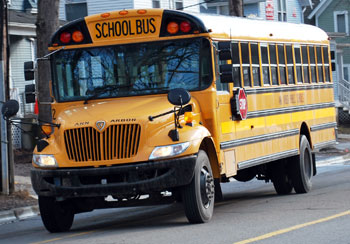Board Applauds AAPS Achievement Gap Plan
Ann Arbor Public Schools Board of Education committee-of-the-whole meeting (March 14, 2012): AAPS trustees discussed the details of superintendent Patricia Green’s newly-minted Achievement Gap Elimination Plan, as presented to them by a set of administrators at their March 14 committee meeting.
After being walked through it, trustees applauded the plan – literally, and most of their comments characterized the AGEP with words like “integrated,” “robust,” “powerful,” and “inspiring.”

From left, AAPS trustees Susan Baskett, Irene Patalan, Glenn Nelson, and Christine Stead at their March 14 committee-of-the-whole meeting, held at Mitchell Elementary School. (Photos by the writer).
Still, the board registered some concerns. Among many elements, the AGEP emphasizes the use of data to inform instruction, and the professional development of teachers. These features of the plan led to a somewhat cool reception from trustee Simone Lightfoot, who wanted to see more emphasis on “common sense” over data, and more emphasis on children than on adults. Trustee Susan Baskett expressed some skepticism based on her experience with the follow-through she’s seen from past AAPS administrations. And, multiple trustees questioned how a wholehearted commitment to the AGEP would affect the district’s allocation of resources.
At its committee meeting, the board did not take any action related to the AGEP. More details of the plan, along with the board’s discussion, are presented below, after the jump.
Also at the committee meeting, the board heard from parents concerned about rising class sizes at the preschool, and heard a review of the student intervention and support services (SISS) department.
A discussion on revenue enhancement ideas was postponed. [Full Story]





